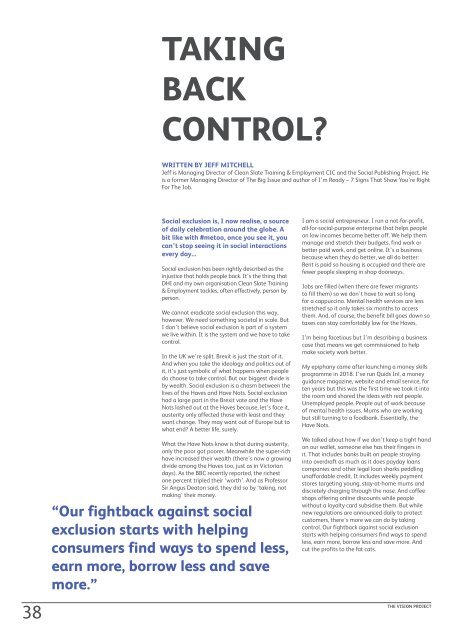The Vision Project
Throughout 2019, Developing Health & Independence (DHI), have been marking their 20th anniversary as a charity by looking to the future. Through articles, events and podcasts, they've asked people to answer the question of how we can achieve their vision of ending social exclusion. This collection of articles includes the contributions of experts from across public life and the political spectrum.
Throughout 2019, Developing Health & Independence (DHI), have been marking their 20th anniversary as a charity by looking to the future. Through articles, events and podcasts, they've asked people to answer the question of how we can achieve their vision of ending social exclusion. This collection of articles includes the contributions of experts from across public life and the political spectrum.
Create successful ePaper yourself
Turn your PDF publications into a flip-book with our unique Google optimized e-Paper software.
TAKING<br />
BACK<br />
CONTROL?<br />
WRITTEN BY JEFF MITCHELL<br />
Jeff is Managing Director of Clean Slate Training & Employment CIC and the Social Publishing <strong>Project</strong>. He<br />
is a former Managing Director of <strong>The</strong> Big Issue and author of I’m Ready – 7 Signs That Show You’re Right<br />
For <strong>The</strong> Job.<br />
38<br />
Social exclusion is, I now realise, a source<br />
of daily celebration around the globe. A<br />
bit like with #metoo, once you see it, you<br />
can’t stop seeing it in social interactions<br />
every day...<br />
Social exclusion has been rightly described as the<br />
injustice that holds people back. It’s the thing that<br />
DHI and my own organisation Clean Slate Training<br />
& Employment tackles, often effectively, person by<br />
person.<br />
We cannot eradicate social exclusion this way,<br />
however. We need something societal in scale. But<br />
I don’t believe social exclusion is part of a system<br />
we live within. It is the system and we have to take<br />
control.<br />
In the UK we’re split. Brexit is just the start of it.<br />
And when you take the ideology and politics out of<br />
it, it’s just symbolic of what happens when people<br />
do choose to take control. But our biggest divide is<br />
by wealth. Social exclusion is a chasm between the<br />
lives of the Haves and Have Nots. Social exclusion<br />
had a large part in the Brexit vote and the Have<br />
Nots lashed out at the Haves because, let’s face it,<br />
austerity only affected those with least and they<br />
want change. <strong>The</strong>y may want out of Europe but to<br />
what end? A better life, surely.<br />
What the Have Nots know is that during austerity,<br />
only the poor got poorer. Meanwhile the super-rich<br />
have increased their wealth (there’s now a growing<br />
divide among the Haves too, just as in Victorian<br />
days). As the BBC recently reported, the richest<br />
one percent tripled their ‘worth’. And as Professor<br />
Sir Angus Deaton said, they did so by ‘taking, not<br />
making’ their money.<br />
“Our fightback against social<br />
exclusion starts with helping<br />
consumers find ways to spend less,<br />
earn more, borrow less and save<br />
more.”<br />
I am a social entrepreneur. I run a not-for-profit,<br />
all-for-social-purpose enterprise that helps people<br />
on low incomes become better off. We help them<br />
manage and stretch their budgets, find work or<br />
better paid work, and get online. It’s a business<br />
because when they do better, we all do better:<br />
Rent is paid so housing is occupied and there are<br />
fewer people sleeping in shop doorways.<br />
Jobs are filled (when there are fewer migrants<br />
to fill them) so we don’t have to wait so long<br />
for a cappuccino. Mental health services are less<br />
stretched so it only takes six months to access<br />
them. And, of course, the benefit bill goes down so<br />
taxes can stay comfortably low for the Haves.<br />
I’m being facetious but I’m describing a business<br />
case that means we get commissioned to help<br />
make society work better.<br />
My epiphany came after launching a money skills<br />
programme in 2018. I’ve run Quids In!, a money<br />
guidance magazine, website and email service, for<br />
ten years but this was the first time we took it into<br />
the room and shared the ideas with real people.<br />
Unemployed people. People out of work because<br />
of mental health issues. Mums who are working<br />
but still turning to a foodbank. Essentially, the<br />
Have Nots.<br />
We talked about how if we don’t keep a tight hand<br />
on our wallet, someone else has their fingers in<br />
it. That includes banks built on people straying<br />
into overdraft as much as it does payday loans<br />
companies and other legal loan sharks peddling<br />
unaffordable credit. It includes weekly payment<br />
stores targeting young, stay-at-home mums and<br />
discretely charging through the nose. And coffee<br />
shops offering online discounts while people<br />
without a loyalty card subsidise them. But while<br />
new regulations are announced daily to protect<br />
customers, there’s more we can do by taking<br />
control. Our fightback against social exclusion<br />
starts with helping consumers find ways to spend<br />
less, earn more, borrow less and save more. And<br />
cut the profits to the fat cats.<br />
THE VISION PROJECT




